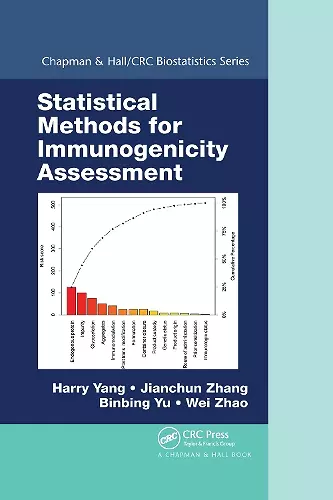Statistical Methods for Immunogenicity Assessment
Develop Effective Immunogenicity Risk Mitigation Strategies
Wei Zhao author Harry Yang author Jianchun Zhang author Binbing Yu author
Format:Paperback
Publisher:Taylor & Francis Ltd
Published:18th Dec '20
Currently unavailable, and unfortunately no date known when it will be back
This paperback is available in another edition too:
- Hardback£89.99(9781498700344)

This book offers essential statistical methods for assessing and managing immunogenicity risk in biopharmaceutical development, providing valuable insights for researchers and practitioners.
Immunogenicity represents a significant challenge in the development of biologics, as it can lead to early product termination or restricted usage if not effectively managed. Statistical Methods for Immunogenicity Assessment provides a comprehensive guide on utilizing robust statistical techniques to detect, quantify, assess, and mitigate immunogenicity risk. The authors delve into the regulatory landscape, ensuring that readers understand the necessary compliance measures while employing advanced statistical methods in their research.
The book emphasizes the importance of immunogenicity assessment in evaluating the safety and efficacy of biopharmaceuticals. By integrating advanced statistical methods into study design and analysis, the authors argue that effective immunogenicity risk assessment and mitigation strategies can be developed. Statistical Methods for Immunogenicity Assessment serves as a single-source reference for statistical concepts, principles, and methods crucial for the detection and control of immunogenicity.
Beginning with an overview of the impact of immunogenicity on biopharmaceutical development, the text covers essential regulatory requirements and statistical strategies for detection and quantification. It includes detailed discussions on anti-drug antibody (ADA) assay development, validation, and optimization, as well as the analysis of critical assay performance parameters. The authors also explore statistical modeling approaches for establishing associations between ADA and clinical outcomes, predicting immunogenicity risk, and formulating effective risk mitigation strategies. Concluding with practical explanations of computer codes and algorithms, this book is an invaluable resource for professionals engaged in immunogenicity risk assessment in both non-clinical and clinical settings.
"In summary, this book is a good resource to the professionals and practitioners developing the biological therapies, including statisticians, clinicians, pharmacokineticists, regulatory reviewers, toxicologists, clinical assay developers, and biopharmaceutical engineers."
~Journal of Biopharmaceutical Statistics
"The authors' work brings light into some of the issues surrounding immunogenicity of drugs. It is of great help to both clinical and nonclinical professionals, while some of the concepts can also be applied to situations when an immune response towards a drug (a vaccine) is desirable."
~Paul Tudor Tamas
"In summary, this book is a good resource to the professionals and practitioners developing the biological therapies, including statisticians, clinicians, pharmacokineticists, regulatory reviewers, toxicologists, clinical assay developers, and biopharmaceutical engineers."
~Journal of Biopharmaceutical Statistics
"The authors' work brings light into some of the issues surrounding immunogenicity of drugs. It is of great help to both clinical and nonclinical professionals, while some of the concepts can also be applied to situations when an immune response towards a drug (a vaccine) is desirable."
~Paul Tudor Tamas
ISBN: 9780367737979
Dimensions: unknown
Weight: 367g
259 pages